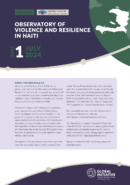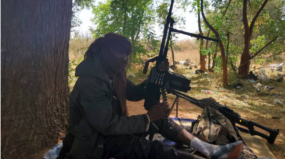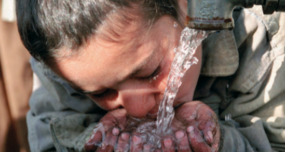Posted on 05 May 2014
Executive summary
Mali’s descent into a war of secession at the start of 2012 was a conflict foretold. Yet what followed proved radically distinct from the country’s three previous episodes of insurgency in its vast, impoverished and arid north. Radical Islamists seized control of the main urban centres of northern Mali, displacing the Tuareg rebels with whom they had struck a working relationship. In the capital, Bamako, a military coup led by an unknown and low ranking army captain overthrew a president who had been in power for a decade. An uneasy stand-off came into being: Mali’s debilitated military guarded the frontiers to the south, while Islamist hardliners and criminals meted out their own version of sharia justice across the north.
As is well known, the decomposition of Malian state authority was finally halted early in 2013. Faced with an Islamist advance to the south, French military forces embarked on a lightning intervention that scattered the extremists and reasserted control over the north. Since then, the pace of Mali’s post-conflict recovery and stabilization has been astonishing: a UN peacekeeping mission and a host of bilateral and EU programmes have been put into place; a new president and a new National Assembly have been elected; peace talks with the more moderate armed groups, though stuttering, are under way.
But as the national government and the international community leave behind the heat of the crisis, it is now incumbent on them to understand what caused such a perilous tailspin to start in Mali, so as to prevent it from reoccurring. As in other countries of West Africa and the Sahel, transnational organized crime has played a prominent role in the affairs of Mali over the past two decades, above all in the north. Drug trafficking, including large consignments of high-value cocaine from Latin America, as well as kidnapping rackets led by Islamist terror groups operating freely across the borders of the Sahel, are both widely regarded as playing key roles in fomenting the instability, unrest and violence that climaxed in 2012.
However, the depiction of a crime–terror nexus in Mali, whereby criminal profits feed insurgent arms and recruitment, does not do justice to the multi-faceted role played by illicit activity across the country. This paper is an attempt to marshal all the available evidence, along with the insights provided by experts in Mali, so as to understand the relations that were forged prior to 2012 between criminal enterprises, communities, political and social elites, armed groups, the Malian state and neighbouring countries. On the basis of recent developments, the paper seeks to outline the likely adaptations that the main illicit networks will now make, and to draw out some recommendations as to how best to temper the criminality and violence that menace Mali’s post-conflict transition.
At the heart of this analysis is an account of how Mali was both the victim of the displacement of drug-trafficking routes and armed jihadist activity from other countries, and a deeply complicit partner in profiting from the incoming wave of illicit trade and Islamist terror. Behind this willing complicity lay the particular vulnerabilities of Malian state and society. Government in Bamako, the country’s capital, had by 2006 replaced direct authority over the north with sporadic, ham-fisted interference. Chronic competition between the north’s many ethnic, caste and clan groups offered numerous possibilities for the political elite in Bamako to find useful allies to do its bidding. However, these social fissures were also fodder for the designs of other, newer parties: nearby states such as Algeria and Libya, criminal organizations seeking to traffic drugs, and radical armed groups. The resulting transactions between supranational forces and local ethnic or tribal factions were to set Mali on the way to the fourth, and arguably the most threatening, insurgency of its post-colonial history.
But Mali’s war was not merely the product of radicalized and internationalized disaffection in the north. The conflict also threw a harsh light on the degradation of the state itself. A model for democratic virtue in Africa, half of whose budget was financed by foreign donors, Mali re-emerged after its coup as a state that had been afflicted by multiple vices. Illicit practices had become rampant across the public sector, corroding popular faith in politicians; Mali’s celebrated elections had in fact received some of the lowest turnouts in the democratic world. Moreover, the day-to-day corruption, patronage and nepotism formed a permissive soil on which an all-powerful presidency could nurture the construction of a shadow state. The greatest drug trafficking scandal of Malian history, the Air Cocaine case of 2009, suggests that official complicity in the criminal business had penetrated the highest echelons of power.
Mali has now set the course for a recovery of legitimate and accountable state authority. Its new president, Ibrahim Boubacar Keïta, has backed a clean sweep of the judicial system and a Truth Commission on violence in the north. Captain Sanogo, the coup leader, is in jail, along with his accomplices. Key Islamist leaders and narco-traffickers have been scattered or neutered, as have the masterminds of the shadow state. From the information available, it would seem that major illicit trafficking across the north has also diminished in scale.
However, it is far too soon to proclaim an end to the crisis. Occasional terrorist attacks and ethnic skirmishes remain a constant headache for local people and UN peacekeepers. At the same time, the pre-war illicit networks are never far away: clearing corruption from the public sector is set to be a long and arduous haul, while illicit networks in political life are destined to regroup and reconfigure, as they have in many other criminalized environments, notably in Latin America. Nearby countries such as Niger and Libya have quickly emerged as staging posts in the Saharan and Sahelian criminal economy.
As Mali negotiates its post-conflict recovery, the focus must be directed at ways to reduce the systemic threat from criminal business while avoiding the sorts of blind repressive policies that have engineered insurgencies in Afghanistan, or terrible bloodshed in Mexico. This paper outlines a number of approaches that should lie at the heart of such a balanced, conflict-sensitive strategy towards crime. A robust and inclusive political settlement for the north is critical, though for this to work attention must now focus on how decentralized or autonomous regional authorities can be supervised without the risk of meddling from Bamako. Provision of security and security reform must be imbued with realism as to what can be achieved with the institutions available, and should be shaped by an emphasis on intelligence-led policing that seeks to sever the most dangerous criminal linkages to power-brokers. Counter-terrorism must also be wise to the intermediation of criminal figures, and to the armed networks that illicit businessmen have cultivated. And lastly, it remains imperative that renascent Mali attacks the roots of the shadow state, and is backed by an international community willing to abandon its hunger for fixers in the state and short-term solutions.
by Ivan Briscoe.



